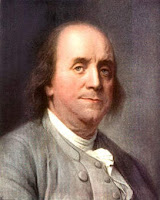 Benjamin Franklin was born on this day, January 17, in 1706. Traditionally considered one of the most nonreligious of America’s founders, more and more evidence is coming to light that Franklin was not the rabid Deist modern revisionist historians would have us believe.
Benjamin Franklin was born on this day, January 17, in 1706. Traditionally considered one of the most nonreligious of America’s founders, more and more evidence is coming to light that Franklin was not the rabid Deist modern revisionist historians would have us believe.
Even before meeting George Whitefield and being impacted by their friendship, Franklin clearly stated his evangelical view of Christ’s atoning death in a debate over the dismissal of the pastor of the Presbyterian church in Philadelphia of which he was a member.
The case involved Samuel Hemphill who was dismissed in 1735 for allegedly emphasizing good works over Christ’s atonement. He was also accused of plagiarizing someone else’s sermons. Franklin defended Hemphill, and with his typical wit, declared that he would prefer hearing good sermons composed by someone else than poor sermons of the pastor’s own composition.
Then, on a serious note, Franklin addressed the accusation that Hemphill had emphasized good works over Christ’s atonement. Demonstrating an impressive depth of faith and understanding, he wrote,
Let us then consider what the Scripture Doctrine of this Affair is, and in a Word it is this: Christ by his Death and Sufferings has purchased for us those easy terms and conditions of our acceptance with God, proposed in the Gospel, to wit, Faith and Repentance: By his Death and Sufferings, he has assured us of God’s being ready and willing to accept of our sincere, though imperfect obedience to his revealed will; By his Death and Sufferings he has atoned for all sins forsaken and amended, but surely not for such as are willfully and obstinately persisted in . . . and that the ultimate End and Design of Christ’s Death, of our Redemption by his Blood, was to lead us to the Practice of all Holiness, Piety and Virtue, and by these Means to deliver us from future Pain and Punishment, and lead us to the Happiness of Heaven, may, (besides what has been already suggested) be proved from innumerable Passages of the holy Scriptures (Hyatt, 1726: The Year that Defined America, 139-40),
The above statement was no fluke, for many years later, in 1757, Franklin proposed to Whitefield, the most famous preacher of the Great Awakening, that they partner together in founding a new Christian colony on the Ohio frontier. They would settle it, he said, “with a large strong body of religious and industrious people.” He included a missionary motive for the colony, saying to Whitefield,
Might it not greatly facilitate the introduction of pure religion among the heathen, if we could, by such a colony, show them a better sample of Christians than they commonly see (Hyatt, 1726: The Year that Defined America, 136-37).
Since Franklin is writing to Whitefield, the fiery British revivalist, his reference to "pure religion" obviously refers to the evangelical revivalism that Whitefield preached. And Franklin was obviously not multicultual for he wanted to see the native people in the area of the proposed colony converted to that kind of Christianity.
It is clear that Benjamin Franklin was not the nonreligious Deist presented in modern textbooks. In fact, if alive today, Franklin would likely be shunned by the Democrat party and by many Republicans because of his “right-wing” Christian views.
It is clear that Benjamin Franklin was not the nonreligious Deist presented in modern textbooks. In fact, if alive today, Franklin would likely be shunned by the Democrat party and by many Republicans because of his “right-wing” Christian views.
This article is derived from Dr. Eddie Hyatt's latest book, 1726, available from Amazon and his website at www.eddiehyatt.com. He is also the founder of the "1726 Project" whose goal is to spread the message of America's birth out of the First Great Awakening and call on believers everywhere to pray for another Great Awakening across the land.

No comments:
Post a Comment